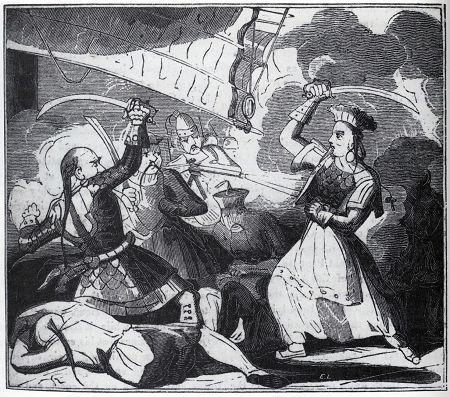Winner of the Spring 2019 StMU History Media Award for
The Article with the Best Introduction
The boiling clouds roll back, the tumultuous sky reduced to a slow simmer. A terrible maelstrom has just passed, wreaking havoc on this small fleet of ships. Shouting commands and curses, men in patchwork clothes run back and forth on the deck of a Chinese junk, hoisting its massive red sails to check for tears. Amidst the chaos, a crew member leans over the side, his eyes growing wide with shock and his words quivering at his lips. Crying out, he finally shouts the reason for his devastation.
Chuánzhǎng sǐle! The captain is dead!1
At this exclamation, the deck falls silent. The sails flap listlessly in the wind, accompanied only by the constant rainfall and the water that rocks the ship. Nobody says a word, the only break in the tableau being a crew member or two removing their hat in respect. Finally, from the cabin below the helm, a woman emerges into the gloom with a young man at her side. She has heard the news. Slowly, she makes her way across the ship to peer down into the sea below. Sure enough, she immediately spies her husband’s body floating like a piece of driftwood among the waves. However, instead of retreating to the cabin to mourn him, as was expected of a woman at that time, she turns to face the rest of the crew. A few high-ranking members have already convened to nominate a successor, but the woman waves her hand dismissively. There is no need for schemes, she says, for she will step up to fulfill the role. The young man beside her eagerly nods his head, immediately vouching for her. In stunned silence and with a perplexed curiosity, all eyes are on her. Who is this woman to assume command over an entire fleet of hardened pirates?2
Her official name was Cheng I Sao. Before that, however, she was Ching Shih.3
***
Ching Shih was born in 1775 to a poor family in Guangzhou, China, where she would grow up to work as a prostitute in a seedy brothel before her capture in 1801 by the infamous pirate captain Cheng I. He intended to exploit her in the same manner that he found her, but fell in love with her almost immediately upon bringing her back to his ship. From the moment she entered the scene, Shih exuded an aura of utmost poise and shrewd confidence. Only a few days after Shih nearly maimed the captain in a retaliatory assault, they were wed. Before the nuptials, though, Shih insisted she would only avow herself to him on one condition—that she would rule over his six fleets beside him. He agreed, and some time after, Shih bore him two sons. The couple later kidnapped and adopted an additional son named Chang Po Tsai during one of their many raids on small villages.4 For years, the family terrorized the southern coast of China—especially the area around the Pearl River Delta—until one fateful day in 1807. A typhoon unlike any other ravaged “the Red Flags,” their principal fleet. During the storm, Cheng I was swept overboard and later perished in the sea, leaving the crew without a captain. It was at this time that Shih stepped up to the plate and volunteered herself as leader, and, with her adopted son and lover vouching for her, it was generally agreed upon that he would become the commander of the Red Flags. Within a few years, Shih gathered around twelve hundred war junks and tens of thousands of buccaneers under her authority.5

During this period, the Emperor of China heard many reports from emissaries about the issue of piracy in the Middle Kingdom, including those of the dreaded Cheng I and his wife, the “Dragon Lady”; but, with so much on his agenda, he could barely spare any attention to these ragtag rapscallions aside from sending ships to investigate and engage in small skirmishes in harbors and up the river. Despite the Emperor’s lackadaisical attitude towards the situation, underestimating the Dragon Lady would soon prove a fatal mistake.6
Now a captain, Ching Shih proved herself an able leader through her management of finances and her establishment of a code of ethics. Aside from the standard fare of punishment for setting ashore without leave, it contained such unusual stipulations as forbidding the rape of female captives on pain of death, as well as requiring villagers to be paid compensation for certain supplies. Perhaps owing to her time spent in poverty as a prostitute, it seemed she held a tender spot in her heart for the most vulnerable among the population. Nevertheless, she refused to return to a life of destitution and was reported to have had no qualms about raiding as many villages as her fleets could manage, as well as ambushing imperial junks and charging protection for merchant ships hauling salt and opium. All passed relatively unnoticed, but when an important government official was killed in an attack, the Emperor finally took notice. He ordered the navy to track the “Dragon Lady” down to Macau, where a vicious standoff left the imperial forces defeated and the entire Pearl River up to Guangzhou available for the taking. Unfortunately, all this pillaging left her Red Flag fleet in desperate need of repairs and her funds in need of replenishing, so she retreated to the island of Lantau near Hong Kong to recuperate—the island where a great battle awaited her.7
***

It’s all quiet on the coastal front, a little too quiet. A northerly wind pushes onto the shore, the leaves in the trees rustling gently on the island of Lantau. Ching Shih sits at her desk, a portrait of sheer consternation, the wrinkles in her forehead having deepened over the course of the last few days. Reviewing her finances for what seems like the thousandth time, she sets the ink down and heads topside. It is only when she arrives on deck that she sees them. Imperial junks and Portuguese man o’ wars emerge from the morning mist like ghosts, all armed to the teeth and speedy to boot. Of course, she has been expecting a showdown like this for quite a while. She just wishes it had been a little later, as most of her flagship fleet is beached and out of use. Still, she shrugs and mutters a prayer to her deceased husband for protection and guidance. Now that she thinks about it, a shift in the breeze would do nicely at this point.8
Captain Ching Shih stares death in the face, as she has done many times in her life. This time, though, she does it with a smile. This time, she will win.9
***
Many days passed through fire and cannon shot in November of 1809, and the air turned black with smoke as volleys passed between the Chinese and foreign navies and Ching Shih’s meager forces. Only a few of her junks were in any sort of fighting shape, and they possessed next to nothing in capability compared to the juggernaut before them. To add salt to the wound, her most intimidating fighting power, the Black Flag fleet, had deserted Shih, even attacking the Red Flag fleet at some points. On top of that, the Red Flag fleet had been damaged in previous battles with the Chinese navy. In order to have at least a sliver of hope of victory, the remaining pirates cast flaming rafts in the water towards the enemy lines, aiming to gain the upper hand by burning their way to triumph, but the wind merely pushed them back towards Shih and her men. At last, when all hope seemed lost, a fortuitous change in the wind caused a flaming raft to smash straight into the midst of the blockade, sending a ship up in smoke. Gaining the upper hand, Shih and the pirates still loyal to her were finally able to get the most seaworthy junks on the waves to wage a great last stand, demolishing many of the enemy’s ships and pushing their way back into the Pearl River.10

The Emperor’s emissaries pressured her to surrender, but she continued to send her fleet to attack and raid around the Pearl River. However, after having balancing more conflicts with the Chinese government and the Black Flag fleet, Ching Shih realized that she must accept the offers of pardon. Although she agreed to surrender, being a woman of an immensely strategic disposition, she insisted that all terms be in her favor. Should the Emperor’s emissaries have balked and refused, she would simply resume her pillaging. After much negotiation and more than a fair amount of threats, legitimate and bluffed on both sides, the Chinese government was out of options and unable to refuse the famed Dragon Lady. They agreed to allow her and her crew to surrender with amnesty from the original executions they were sentenced to, in addition to all the wealth that Shih amassed since the day she married Cheng I in 1801. Retiring at the age of thirty-five, Shih inevitably returned to the brothel she wished she’d never see again—this time, however, as a very rich and successful manager, never to live in poverty again until she passed away at the age of sixty-nine.11
***
Resting by the water, an aging Ching Shih is reminded of the dauntless years of her youth. In small ripples on the surface, she sees distorted reflections of her beloved husband, the battles she fought, and the conquest of the waves which will forever be attributed to her name. No longer wielding a cutlass or beheading unruly subordinates, Shih has found peace at long last.12
- Pirates Through the Ages Reference Library, 2011, s.v. “Pirate Surrender Document.” ↵
- Pirates Through the Ages Reference Library, 2011, s.v. “Pirate Surrender Document.” ↵
- Pirates Through the Ages Reference Library, 2011, s.v. “Sao, Cheng I.” ↵
- Pirates Through the Ages Reference Library, 2011, s.v. “Sao, Cheng I.” ↵
- Pirates Through the Ages Reference Library, 2011, s.v. “Pirate Surrender Document.” ↵
- Alfred S. Bradford, Flying the Black Flag (Westport: Praeger Publishers, 2007), 144-148. ↵
- Cheng I Sao – Pirate Queen, video file, 10:50, YouTube, posted 2013, https://www.youtube.com/watch?v=-p2lhxUqMMQ. ↵
- Cheng I Sao – Pirate Queen, video file, 10:50, YouTube, posted 2013, https://www.youtube.com/watch?v=-p2lhxUqMMQ. ↵
- Cheng I Sao – Pirate Queen, video file, 10:50, YouTube, posted 2013, https://www.youtube.com/watch?v=-p2lhxUqMMQ. ↵
- Cheng I Sao – Pirate Queen, video file, 10:50, YouTube, posted 2013, https://www.youtube.com/watch?v=-p2lhxUqMMQ. ↵
- Ann Shen, Bad Girls Throughout History: 100 Remarkable Women Who Changed the World (San Francisco: Chronicle Books, 2016), 45. ↵
- Ann Shen, Bad Girls Throughout History: 100 Remarkable Women Who Changed the World (San Francisco: Chronicle Books, 2016), 45. ↵



67 comments
Avery Mascorro
It was amazing to see that the pirates on board just accepted that she would be the new captain. I was impressed by her strategy and finance work. Im glad her final battle didn’t end terribly because that what I was expecting, but she was intelligent enough to surrender and save herself. She kept her promise of never returning to poverty.
Engelbert Madrid
Unlike any other pirate story, Ching Shih was a brave woman who had the courage to lead a group of men to fight against their enemies that killed her husband. This is quite interesting, because pirates were mainly men who were savages and evil, while these pirates followed the orders of a woman, who was intelligent and strong. No wonder Ching Shih was successful to win battleships against other pirates.
Joshua Garza
This empress was nothing short of a pure brutal soul, even among-st the many other wild world leaders at this day in age where brutality inflicted on other groups of people was just a primary way of showing the might and honer of yourself and the nation they led but for a woman to do it in this time period ids bizarre. She really did not have much to lose and its noticeable from the article.
Dalton Moy
This was a very interesting article to read. I had never heard of a group of pirates being run by a women, mostly due to the stereotypical view of a pirate. I find it very cool that rather than shedding bitter tears at the sight of her husband’s body, she immediately took on the responsibility to lead his crew. As seen by the story, she did a phenomenal job of leading the crew and she made a name for herself that would be greatly remembered throughout history.
Thank you for a very interesting read.
Noah Wesolowski
I did not know much about china’s history or any of their famous historical figures. Ching Shih may have had a rough childhood growing up poor but it didn’t seem to stop her from becoming famous. She was even captured by a infamous pirate at one time. When she saw a chance to take control of the ship she took it which later led to her controlling more ships.
Isaiah Torres
I like hearing stories about women striving and doing good for a group of people because I feel like back in the day, it was rare that a woman would have any type of leadership role. Seeing a woman step up to the plate this way, and seeing how they actually allowed her to show some sort of guidance was really cool. I also liked reading about how the rough childhood didn’t stop her from doing good in her life. I hope this story is shared more and they give her a lot more recognition.
Diego Terrazas
She must have had been highly revered by her pirate mates if they let a woman become the captain. Although the activities that pirates en devour in are not ethical, her developing a code of ethics was admirable. In addition, her fleet was so good the Chinese government was not able to challenge them and they even pardoned their crimes, they must have been powerful!
Antonio Coffee
This was an excellent story about a very brave and strong woman. This was very interesting to read as in most cultures woman would not have been able to gain this position and keep it for as long as Ching Shih did. What is even more impressive is that she was able to outmaneuver a larger and more powerful force. This story was amazing because it shows a little known part of history and makes it known in an interesting way.
Katherine Wolf
Great article! You almost feel like you are there with Ching Shih. I do not know much about Chinese history so I hope that more articles like this one will be published. I think it is amazing that the government bowed to her wishes and she got to retire in peace with her wealth at only thirty five. This article also reminded me of some famous English female pirates, though their stories did not end so happily.
Mariah Cavanaugh
Your title and main image were both captivating! After seeing them, I instantly wanted to read about a “Scallywag Empress.” I am now in awe of Ching Shih and her determination and her defiance to the status quo. I must say that I must have reread the sentence in which you stated that “forbidding the rape of female captives” was an “unusual stipulation” at least 4 times. I know that we must look at situations such as these with historical context and avoid applying our 21st century beliefs but sometimes that proves difficult. This was honestly a fantastic article!
Tyler Reynolds
This was a neat topic to choose. The article was well formatted and structured. I enjoyed the introduction. I do wish the author would use more sources.
I do enjoy such peculiar stories about individuals in combat or in certain combatant groups that you wouldn’t expect to be there. This story reminds me of another story I read about discussing the stories of blacks enlisted within the German Army during WW2.
Danielle Slaughter
Thanks for the feedback, Tyler! I’ll definitely keep that in mind for my next article. There was a wealth of sources, but only a handful with the extensive information necessary to construct this story. Glad you enjoyed the topic!